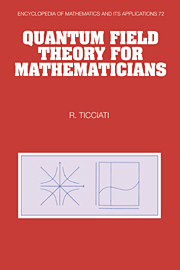Book contents
- Frontmatter
- Contents
- Preface
- Introduction
- 1 Relativistic Quantum Mechanics
- 2 Fock Space, the Scalar Field, and Canonical Quantization
- 3 Symmetries and Conservation Laws
- 4 From Dyson's Formula to Feynman Rules
- 5 Differential Transition Probabilities and Predictions
- 6 Representations of the Lorentz Group
- 7 Two-Component Spinor Fields
- 8 Four-Component Spinor Fields
- 9 Vector Fields and Gauge Invariance
- 10 Reformulating Scattering Theory
- 11 Functional Integral Quantization
- 12 Quantization of Gauge Theories
- 13 Anomalies and Vacua in Gauge Theories
- 14 SU(3) Representation Theory
- 15 The Structure of the Standard Model
- 16 Hadrons, Flavor Symmetry, and Nucleon-Pion Interactions
- 17 Tree-Level Applications of the Standard Model
- 18 Regularization and Renormalization
- 19 Renormalization of QED: Three Primitive Divergences
- 20 Renormalization and Preservation of Symmetries
- 21 The Renormalization Group Equations
- Appendix
- References
- Index
2 - Fock Space, the Scalar Field, and Canonical Quantization
Published online by Cambridge University Press: 31 October 2009
- Frontmatter
- Contents
- Preface
- Introduction
- 1 Relativistic Quantum Mechanics
- 2 Fock Space, the Scalar Field, and Canonical Quantization
- 3 Symmetries and Conservation Laws
- 4 From Dyson's Formula to Feynman Rules
- 5 Differential Transition Probabilities and Predictions
- 6 Representations of the Lorentz Group
- 7 Two-Component Spinor Fields
- 8 Four-Component Spinor Fields
- 9 Vector Fields and Gauge Invariance
- 10 Reformulating Scattering Theory
- 11 Functional Integral Quantization
- 12 Quantization of Gauge Theories
- 13 Anomalies and Vacua in Gauge Theories
- 14 SU(3) Representation Theory
- 15 The Structure of the Standard Model
- 16 Hadrons, Flavor Symmetry, and Nucleon-Pion Interactions
- 17 Tree-Level Applications of the Standard Model
- 18 Regularization and Renormalization
- 19 Renormalization of QED: Three Primitive Divergences
- 20 Renormalization and Preservation of Symmetries
- 21 The Renormalization Group Equations
- Appendix
- References
- Index
Summary
Providing complete knowledge of the free scalar field and the space of many-particle states — the foundation for perturbative canonical quantization.
Introduction
In this chapter, we shall develop a relativistic quantum theory of a single scalar field using the one-particle state space and the unitary representation of the Poincaré group on that space described in the last chapter. There are two spurs that give direction to the construction of a scalar field theory. The first is that at relativistic energies, pair production contributes significantly to scattering processes. This motivates us to build an extended state space (a Fock space) in which states can have any number of particles. The second is that, if we localize measurement by making observables ø functions of position x in space-time, then we must construct ø in such a way that this field of operators has Lorentz transformation properties appropriate to its status as a field of observables.
In Section 2.1, we construct the Fock space for a non-interacting assemblage of particles of a single type. Section 2.2 reviews the construction of ladder operators for the simple harmonic oscillator, and Section 2.3 transforms them into the creation and annihilation operators which connect the whole of Fock space to its foundation, the vacuum state.
- Type
- Chapter
- Information
- Quantum Field Theory for Mathematicians , pp. 13 - 35Publisher: Cambridge University PressPrint publication year: 1999

